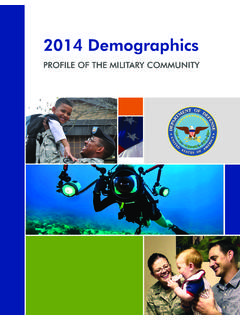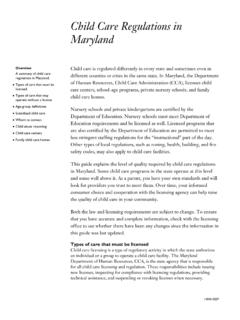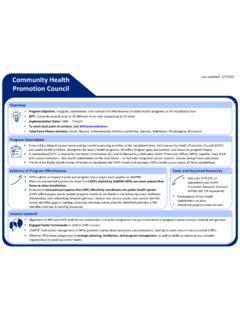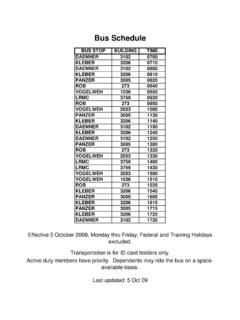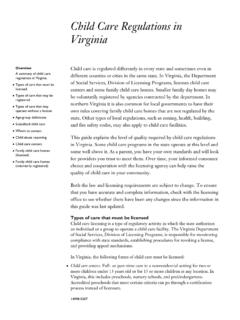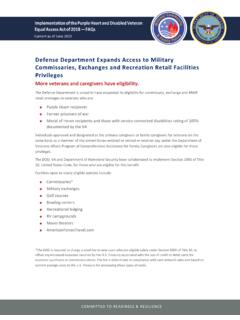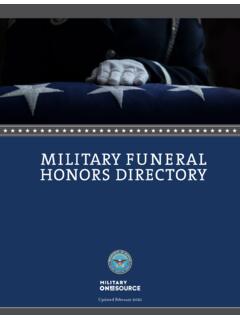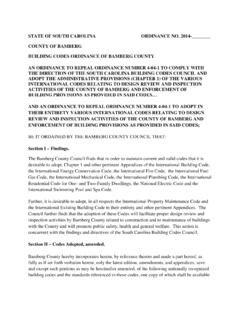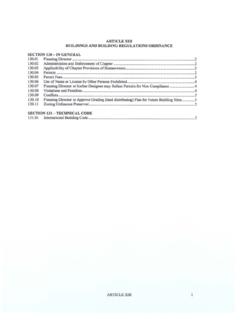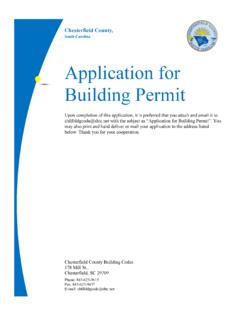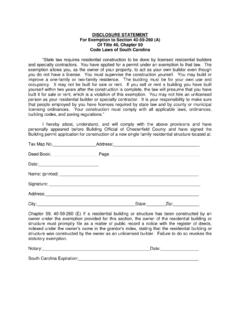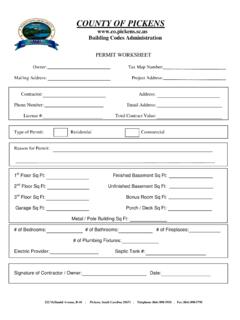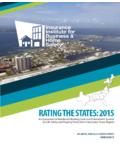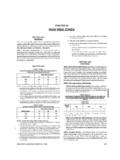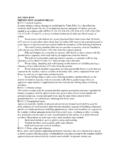Transcription of Child Care Regulations in South Carolina
1 14084-0207 Child care Regulations in South Carolina Child care is regulated differently in every state and sometimes even in different counties or cities in the same state. In South Carolina , the Department of Social Services, Division of Child care Services, licenses Child care centers and group Child care homes. It also registers all other family Child care homes and some church-operated facilities. Other types of local Regulations , such as zoning, health, building, and fire safety codes, may also apply to Child care facilities. This guide explains the level of quality required by Child care Regulations in South Carolina . Some Child care programs in the state operate at this level and some well above it. As a parent, you have your own standards and will look for providers you trust to meet them. Over time, your informed consumer choice and cooperation with the licensing agency can help raise the quality of Child care in your community.
2 Both the law and licensing requirements are subject to change. To ensure that you have accurate and complete information, check with the licensing office to see whether there have been any changes since the information in this guide was last updated. Types of care that must be licensed Child care licensing is a type of regulatory activity in which the state authorizes an individual or a group to operate a Child care facility. The South Carolina Department of Social Services, Division of Child care Services, is responsible for monitoring compliance with state standards, establishing procedures for revoking a license, and providing appeal mechanisms. In South Carolina , the following forms of Child care must be licensed: Child care centers: full- or part-time care in a nonresidential setting for 13 or more children Group Child care homes: full- or part-time care in a residence for seven to 12 children, including family members under 12 years old Overview A summary of Child care Regulations in South Carolina .
3 Types of care that must be licensed Types of care that must be registered Types of care that may operate without a license Age group definitions Subsidized Child care Whom to contact Child abuse reporting Child care centers Large family Child care homes Small family Child care homes 2 z Child care Regulations in South Carolina Types of care that must be registered Registration is a form of regulation that typically emphasizes self-inspection by the caregiver and encourages active parental monitoring of facilities. In South Carolina , family Child care homes, as well as some religious facilities, must be registered, but may choose to be licensed. Family Child care homes: full- or part-time care in a residence for one to six children, including family members under 12 years old Child care centers operated by churches or religious entities: full- or part-time care in a nonresidential setting for 13 or more children These centers can be required to have licenses if they receive state or federal Child care assistance.
4 More detailed information on Child care centers, group Child care homes, and family Child care homes can be found later in this guide. Types of care that may operate without a license or registration Some types of Child care are not required to be licensed or registered by the state. There are no agencies investigating or regulating these providers, so be sure to thoroughly check a provider s background and experience before choosing this type of care . In South Carolina , the following forms of Child care are exempt from licensing or registration: care provided in the Child s home or by relatives care in the provider s home for children of one family unrelated to the provider Any program for preschool and kindergarten children operating fewer than four hours a day or fewer than two days a week Summer camps Bible schools Child care programs run by churches or other religious organizations that receive no public funds and have not applied for a license are less strictly regulated.
5 When public schools run preschool programs, licensing rules do not apply because they fall under the jurisdiction of the Department of Education. 3 z Child care Regulations in South Carolina Age-group definitions Infant: Child under 12 months Toddler: Child between 12 and 23 months 2-year-old: Child between 24 and 35 months Preschooler: Child 3 or 4 years, but not yet eligible for public kindergarten School-age: Child 5 years or older Subsidized Child care The South Carolina Department of Health and Human Services has a statewide system, funded by the Child care and Development Fund (CCDF), which makes funds available to assist families with their weekly Child care expenses. This program is named Advocates for Better care (ABC). Aid to families depends not only on the need of the family but also on the availability of services.
6 Income-eligible parents must be working, in school or in a training program. For further information about program availability and how to qualify, contact: South Carolina Department of Social Services Box 1520 Columbia, SC 29202-1520 803-898-7601 or 803-898-2570 (for vouchers, in specific) Whom to contact For more detailed information regarding Child care Regulations in South Carolina , to obtain a copy of the state standards, or to report licensing violations, contact: South Carolina Department of Social Services Division of Child care Licensing and Regulatory Services 2638 Two Notch Road, Suite 200 Columbia, SC 29204 803-253-4049 Child abuse reporting The staffs of all Child care facilities are required to report known or suspected Child abuse or neglect to the state or to police. To report suspected Child abuse, contact the South Carolina Department of Social Services, Child Protective/Preventive Services at 803-898-7318.
7 4 z Child care Regulations in South Carolina Child care centers Licenses Must be licensed and renewed every two years; Regulations apply to profit, not-for-profit, and private centers. The Regulations do not apply to educational facilities that operate solely for educational purposes from grade 1 or above; kindergarten programs for 5-year-olds; kindergarten or nursery schools operating no more than four hours per day, along with receiving children younger than legal school-age; other facilities operating less than four hours per day in a shopping center, on a nonroutine basis, and where the parents are in the immediate vicinity; summer day or resident camps, bible schools; facilities for the mentally challenged; or centers owned and operated by a church, religious denomination, college, or university that does not receive state or federal financial assistance.
8 Must be at least 21 years old to obtain a Child care license. License is required for centers with 13 or more children. License must be posted. Liability insurance is not required. Staff: Child ratios Birth to 1 year: one staff for up to five children (1:5) 1 year: one staff for up to six children (1:6) 2 years: varies; one staff for up to seven, eight, or nine children (1:7, 1:8 or 1:9) 3 years: varies; one staff for up to 11, 12, or 13 children (1:11, 1:12 or 1:13) 4 years: varies; one staff for up to 16, 17, or 18 children (1:16, 1:17 or 1:18) 5 years: varies; one staff for up to 19, 20, or 21 children (1:19, 1:20 or 1:21) 6 to 12 years: one staff for up to 23 children (1:23) Naptime and overnight care have less stringent ratios. More stringent ratios are required for swimming and for mildly ill children. Maximum group size No requirements Staff qualifications Director Must be at least 21 years old.
9 5 z Child care Regulations in South Carolina Must have one of the following: - Four-year college degree in a Child -related area with 18 credits in Child development or early childhood education - Four-year college degree plus six months of experience - Two-year college degree in a Child -related area with 18 credits in Child development or early childhood education, and six months of experience - Child Development Associate (CDA) credential and one year of experience - High school diploma or general equivalency diploma (GED) plus three years of experience (one of which must be in a supervisory role) - Co-directors required if the program operates more than 12 hours per day All experience for a director or co-director must be in a licensed Child care facility. Teacher Must have one of the following: - Eighteen years of age, a high school diploma, and at least six months of experience - Direct supervision for six months by staff who has had one year of experience as a teacher - Six hours of training in Child growth and development and family childhood education or be under direct supervision - Two years as a teacher as of July 1, 1994, or is exempt from the high school diploma - Bachelor s degree in Child -related area; no supervision is needed May be 16 years old and supervised by a teacher at all times.
10 Must attend an orientation. Assistant Must have a high school diploma and six months of experience. Staff under 18 years old and with less than one year of experience must be supervised. Must be able to read and write. Must attend orientation. Staff training Director must have 20 hours annually with at least five hours in Child growth and development, early childhood education, and health and safety, and five hours in curriculum activities, nutrition, guidance, or professional development for 6 z Child care Regulations in South Carolina children. Also, must complete a course required by the Occupational Safety and Health Administration (OSHA) on blood borne pathogens. Staff must have 15 hours annually with at least five hours in Child growth and development and five hours in curriculum activities for children. The remaining hours will be in guidance, health, safety, nutrition, or professional development, as well as the course required by OSHA in blood borne pathogens.
